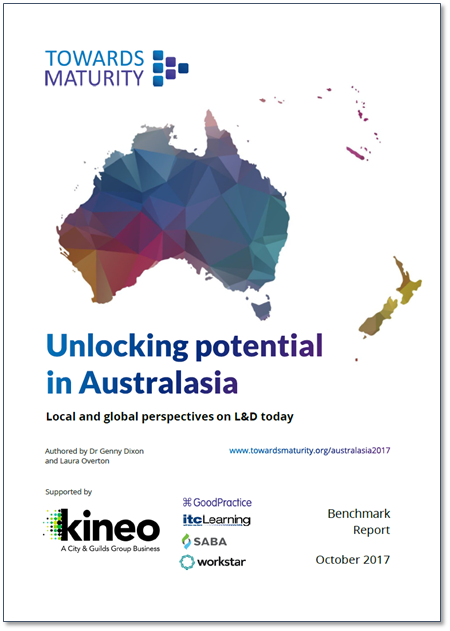
Does Australasia lead in the global adoption of learning technologies?
New research from Towards Maturity explores this question and found that L&D leaders in Australia and New Zealand are 11% more likely to solve problems through the use of learning technologies.
Towards Maturity has today released a first of a kind with their regional benchmark report ‘Unlocking potential in Australasia’. Conducted in collaboration with local partners,Kineo, Good Practice, ITC Learning, Saba, Workstar AITD and the ILP this new research shines a spotlight on the L&D landscape in Australia and New Zealand.
The study compares the state of workplace learning within the region with companies achieving the best results from modernisation of their learning strategy worldwide. Distilling the secrets of that success, the research highlights the region's unique opportunities for the future of learning and explores how to accelerate progress.
There are a number of areas where the region is excelling and we have seen a significant shift in mentality when it comes to learning technologies. In 2014 80% reported that their organisational culture did not support social learning, today it’s just 33% . Compared to the 2016 benchmark sample as a whole, organisations in Australasia are more aware of the advantages of using social media in learning and development, with a higher proportion using in-house platforms and fewer L&D leaders reporting barriers related to social media use:
-
64% are using in house social networks ( compared to 52% of the rest of the world)
-
73% are using VOIP conferencing (compared to 60% of the rest of the world)
However whilst attitudes are changing the anticipated increase on technology spend has not materialised. Despite 93% of L&D leaders looking to technology to help them respond faster to changing business conditions, only 17% of training budget is being spent on learning technologies.
Whilst the region faces challenges around resourcing, support from suppliers outside of the region, budget and L&D capability they have made it a priority this year to improve efficiency and modernise the process of learning to improve performance, business impact and employees’ agility.
Towards Maturity CEO Laura Overton shares her thoughts on the latest report:
“I am delighted to be launching our first ever regional benchmark with Australia and New Zealand. It is great to see how our global benchmark is growing and helping move the industry forward as a whole. Whilst Australasia is driving ahead with the use of technology there is still a long way to go yet. I am excited to see what the future of L&D holds for Australia and New Zealand, watch this space!”
Matt Johnson, Global Managing Director at the Kineo, the platinum sponsor of the report, adds:
“As I look at our organisations around the globe, I see everyone at different stages of their journey. In Australia and New Zealand, I consistently see a willingness to try something new - to explore new horizons and to look at things differently. ‘Unlocking Potential in Australasia’ uncovers how to deliver true learning innovation to maximum effect by exploring great local practices locally and examining them in a global context. This report puts the evidence directly into our hands, and to helps us build the confidence we need to truly transform learning.”
Download the report at: www.towardsmaturity.org/australasia2017
Note to editors
Laura will be available for interviews in Sydney between Monday 23rd October– Friday 27th and in Melbourne between Monday 30th October – 3rd November 2017. Please contact Jax Harvey to arrange a meeting.
Methodology
Data for this report is drawn from:
-
The Towards Maturity 2016 Benchmark™ research with over 600 L&D leaders, reported in Unlocking Potential (www.towardsmaturity.org/2016benchmark), free to download thanks to the support of Towards Maturity Ambassadors.
-
Regional data was taken from over 120 learning professionals in Australia and New Zealand who took part in a Towards Maturity Benchmark between May 2016 and July 2017.


